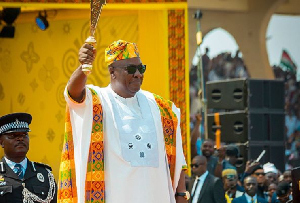The Ghana National Chamber of Commerce and Industry (GNCCI) has urged government to consider introducing urgent incentives to address what it described as shortfalls in the 2024 budget.
Although government has introduced a number of tax reliefs for selected sectors, such as local automobile assembly and textiles, the Chamber stressed that they fail to address the major tax concerns raised by industry – hence the need to put together an auxiliary policy that will provide some marginal tax respites. It warned that anything less than this will render the budget impotent.
GNCCI-President, Clement Osei-Amoako, emphasised that provisions in the 2024 budget are not capable of empowering the sector private to participate in the economic growth process; instead, the 2024 budget heavily relies on external funds – making the economy susceptible to commitment changes.
“The Chamber’s stand is that the budget attempted to touch on some of industry’s concerns raised about the difficulty in doing business, but government failed to look at the core of issues we have raised in terms of tax reduction, support and incentives. We want to reiterate that if government does not in the short-term look at how to address some of these persisting concerns, then the budget will be rendered impotent at the end of the fiscal year.
“It is worth noting that while the revisions made to some specific tax policies may offer some relief to a minor section of the private sector, they will not yield the transformative impact that our businesses and the entire economy require,” he said.
The Chamber-president made these remarks at the GNCCI 2024 national budget review exercise held at its head office in Accra.
Explaining why the 2024 budget did not meet GNCCI’s expectations, he mentioned that government failed to abolish the COVID-19 Levy, which in its assessment has outlived its relevance and become an additional burden on businesses.
Additionally, businesses expected a significant reduction in government expenditure to foster a more efficient allocation of resources and reduce the tendency of government to borrow. Yet the budget drawn for 2024 is a deficit budget, with government expecting to increase revenue generation by 31.7 percent and also increase expenditure by 31 percent.
The Chamber advocated for an expansion of the tax net to ensure a fair distribution of the tax burden – but not much provision was made in that regard, it lamented. Moreover, it also expected a reconsideration of the current Value Added Tax (VAT) system; urging a return to the structure that prevailed in the year 2016.
The Chamber proposed a graduated system of tax payment based on annual turnover and employment size – expressing dissatisfaction with government’s current flat corporate tax rate of 25 percent across all businesses, which acts as a disincentive for SMEs.
“We firmly believe that such adjustments will stimulate economic growth, encourage investments and fortify the private sector’s resilience,” stated the GNCCI.
Director-Institute of Statistical, Social and Economic Research (ISSER) at the University of Ghana, Prof. Peter Quartey, speaking on the theme ‘The Impact of the 2024 National Budget on Private Sector and Opportunities’, said unfortunately the budget is a deficit one – and the three percent economic growth projection has been cancelled out by the population growth rate of two percent per annum. This, he said, means there will be no significant impact from the projected growth if achieved.
“Now that the budget statement is out, I think government must consider some marginal reduction in taxes for industry in the mid-year budget review to boost local production and alleviate the plight of manufacturers,” he said.
Business News of Tuesday, 5 December 2023
Source: thebftonline.com

















